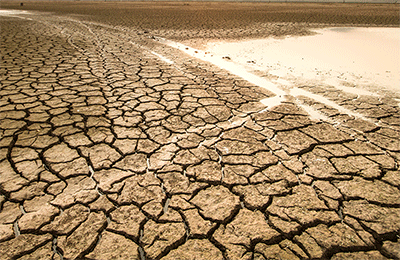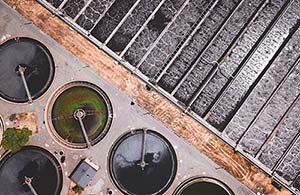

How Waterproof is Industry 4.0?
Industry 4.0 is the new industrial revolution. The digitalisation of systems to optimise production processes as a result of integrating collaborative technologies. Although improvements in industry production have always been linked to technological advancements, Industry 4.0 has ultimately reversed this system for optimum efficiency. This means a process can now inform us where improvements are needed by analysing the process to see if there is a more efficient one.
Companies have been forced to digitalise to effectively automate processes, generating reams of ‘big data’ which even the most innovative companies struggle to utilise in the most effective way. A key aim for Industry 4.0 is the potential to use all this data. One of the biggest challenges facing the water industry is the inability to turn available data into insightful information that permits effective decision making within these processes.
What Does IoT Mean for Water?
As the Internet of Things (IoT) continues to grow exponentially, it is also creating new opportunities and solutions for many key aspects of the industrial sector. Despite dispute about the ‘official’ definition for IoT, AIOTI define it as a:
Dynamic global network infrastructure with self-configuring capabilities based on standard and interoperable communication protocols where physical and virtual ‘things’ have identities, physical attributes, and virtual personalities using intelligent interfaces for seamlessly integrating into the information network.”
Recently, IoT applications have been utilised widely to assist integration of autonomous systems and humans. In the water industry, IoT is used to assist the water organizations and municipalities by helping to manage water infrastructure and water supply using smart devices. Application of IoT for water management creates optimization techniques to reduce cost and improve efficiency but has been applied in few other ways to fully optimise available data.
Applications include measurement of the water pressure through pipes and identifying leaks quicker across a water distribution/transportation system, for example. Benefits of IoT sensors on these systems include factors such as:
-
Quality control of water reserves
-
Efficient systemic water management
-
Water leakage detection
-
Water quality and safety monitoring
-
Transparency of consumption
-
Prescriptive maintenance on infrastructure
Digitalising Water
Introduction of industry 4.0 has created a platform for the water industry to become smarter through technologies such as IoT. These technologies provide smart water management systems the ability to collect and analyse valuable data, which can be analysed to develop environmentally friendly and sustainable techniques for managing water infrastructure and distribution.
In response to this knowledge gap, Siemens developed the 'Digital Enterprise' – a comprehensive portfolio of software and automation solutions for efficient and reliable water management. Through launching a comprehensive data model, it became possible to harness the full potential of all systems in the water industry, including water supply and sewage systems, and pump stations and desalination plants to create a digital twin: A precise, virtual model of a water or wastewater plant that can remains constantly up to date.
This intelligent linking of data is one thing, with the obvious benefits of optimisation in toe, however, the end-to-end networking of system engineering is a merging of the virtual and real worlds that the industry is still exploring. The companies forging the way in this field are providing increasing opportunities here to match predictions of continued growth in the market in the coming years.
Badger Meter offers an end-to-end solution with advanced metering analytics. This intuitive software combines proven cellular communication technologies with targeted advanced metering analytics to enable greater visibility and control over water resources. The system works with interval meter data to address demands for actionable intelligence and improve operations. Through our work with Badger Meter here at CM Industrial, we can see this growth is clear.
Overcoming Challenges
Challenges brought to light by COVID mean industry digitalisation is more crucial than ever. The optimisation and efficiency made possible by Industry 4.0 helps ensure continuity and resilience planning for a vast range of businesses.
According to Aude Giard, Chief Digital Officer of Veolia Water Technologies:
We will witness a downgrade of capital spending in the water sector but the opportunities in the digital sector will remain unchanged.”
Easier remote operations and better asset performance management means customers yet to embrace the benefits of digital will begin to lag. The new reality of working from home and reliance on virtual integrations mean digital functionalities have become a business essential, rather than an unnecessary overhead. Industry 4.0, and its promise of increased visibility and performance with data, can facilitate this with AR, whilst ensuring operational resilience through predictive analytics and simultaneously reducing expenditure using prescriptive maintenance.
Urban population growth, climate change, water supply risk and aging infrastructure are just some challenges facing the water industry, however, we must also consider additional factors. Outcomes of increased demand include increasing energy costs, emergency response actions, environmental risk, regulatory change, infrastructure security and community relations – some of which integration of these technologies can help overcome.
What do you think of the impact of Industry 4.0 on the water industry? I’m really looking forward to seeing how the market continues to grow alongside its continued digitalisation through the introduction of industry 4.0 and its increased uptake across the industry.
Are you interested in discussing opportunities within the water industry with me in some more detail? Drop me a message at max.fraser-krauss@industrial-cm.com to chat!
Find out more about what we do at CM Industrial, here.
Recommended.

How do we Solve our Global Crisis of Water Scarcity?
To discuss solutions to the global water scarcity challenge I invited experts Nick Bognanno, Chandra Mysore, and Sabine Stuiver to join me on a live webinar, as part of our ‘Future of Smart Cities’ series. Click to read more.

How to Build a Smart Water Network.
There’s no disputing that the introduction of smart water networks is moving from nice-to-have to must-have to futureproof our environmentally conscious cities. I invited leaders in the space to discuss the future of smart water.

How Waterproof is Industry 4.0?
Industry 4.0 is the new industrial revolution. The digitalisation of systems to optimise production processes as a result of integrating collaborative technologies. But what does it really mean for water?

How to Build a Smart Water Network.
What impact will smart cities have on the future of the water industry? And how do we go about creating smart water networks for these cities? Click to find out from our webinar.
Comments.